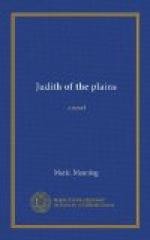Hawks now leaned across the table with a sinuous, beguiling motion, and, extending his long neck towards the prospector, with the air of a turkey-gobbler about to peck, he crooned, softly: “Ira, it’s a heap risky puttin’ your faith in maverick sharps that trail around the country, God-a’mightying it, renaming little, old rocks into precious stones, seein’ gold mines in every gopher-hole they come to. They names your backyard and the rocks appertainin’ thereunto a heap fashionable, and like as not some sucker gives him good money to float the trash back East.”
Mrs. Rodney, whose partisanship in any discussion was analogous to the position of a hen perching on a fence unable to decide on which side to flutter, was visibly impressed by Hawks’s presentation of the case. Looking towards her daughter from under the eaves of her sun-bonnet, she “‘lowed she had hearn that Bad Water was hard on the skin, an’ that it warn’t much of a place arter all. Folks over thar war mostly half-livers.”
Ira, now losing all semblance of policy at being thus grievously put down by his possible mother-in-law, “reckoned that herdin’ sheep over to the Basin was a heap easier on the skin than livin’ in a comf’table house over to Bad Water”—this as a fling at Hawks, who herded a small bunch of sheep “over in the Basin.”
“Ai-yi,” openly scoffed the former Miss Tumlin; “talk’s cheap before—” She would have considered it indelicate to supply the word “marriage,” but by breaking off her sentence before she came to the pith of it she continued to maintain the proprieties, and at the same time conveyed to her audience that she was too old and experienced to permit any fledgling from her nest to be caught, for want of a warning, by such obvious ante-matrimonial chaff as fair promises.
“Laws a massy!” she continued, reminiscently, working her toothless jaw to free it from an escaped splinter from the snuff-brush. “When me an’ paw war keepin’ comp’ny, satin warn’t good enough for me. He lowed I wuz to have half creation. Sence we wuz married he ’ain’t never found time, endurin’ all these years, to build me a bird-house.”
The unbuilt bird-house was the Banquo’s ghost at the Rodney board, Mrs. Rodney hearkening back to it in and out of season. If the family made merry over a chance windfall of game or fresh vegetables, a prospect of possible employment for one of the boys, a donation of money from Judith, Mrs. Rodney remembered the unbuilt bird-house and indulged herself to the full of melancholy. It is not improbable that, if she had been asked to name the chiefest disappointment of her wretched married life, she would have mentioned the bird-house that was never built.
At mention of it Warren Rodney murmured broken, deprecatory excuses. His dull eyes nervously travelled about the table for some one to make excuses for him. The family broke into hearty peals of laughter; the tragedy of the first generation had grown to be the unfailing source of merriment for the second.




